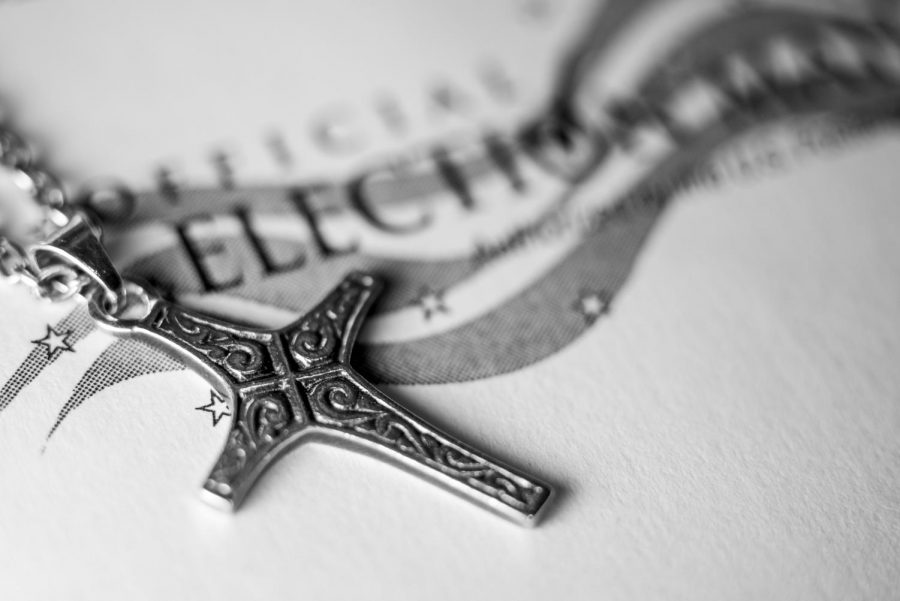Opinion: Catholics should vote their conscience
October 20, 2020
I am not going to tell anyone how to vote this year, that would violate the substance of what I want to say. But I will tell you Archbishop Aymond put it in a public letter recently that no priest, bishop or other Catholic official should tell you how to vote either. I believe it is morally wrong to do so.
As is often the case, considerations about voting begin with human dignity and the common good –– the twin foundations of Catholic social doctrine.
In its deliberations 55 years ago, the Second Vatican Council made it clear both that governments should allow all of their citizens the right to participate in the political process and that all citizens should act on those opportunities to participate:
“Hence let all citizens be mindful of their simultaneous right and duty to vote freely in the interest of advancing the common good.”
The Council goes on to underscore the universal requirement of a system of laws which protect the exercise of individual rights and the recognition of those rights and duties by all in society. This duty of government and law is an expression of the first element of the common good as spelled out in the “Catechism of the Catholic Church,” namely, that “public authorities are bound to respect the fundamental and inalienable rights of the human person.”
As we face another election cycle, we reflect on the role of citizen Catholics and our voting. When doing so, we recognize many factors in voting for candidates –– both salient issues in Catholic social teaching and the opportunity, competence and character of every candidate.
Every four years, since at least 1975, the U.S. Catholic bishops have issued a pastoral letter on political responsibility one year before the presidential and congressional election. In “Forming Consciences for Faithful Citizenship,” the U.S. bishops describe our responsibilities for political life, forming conscience and Catholic social teaching. Reading the entire text is essential preparation for the upcoming elections.
Crucially, this letter also points out that no existing party or platform in the U.S. comports with Catholic teaching, which effectively cuts across contemporary partisan divides.
The body of the document, the Pastoral Letter, has remained unchanged from 2015 and has been substantially the same since 2007. In the full document, the bishops describe the moral principles underlying public issues and their policy applications. Only the covering letter was updated at the November 2019 U.S. bishops’ meeting a year ago. In that cover letter, the bishops wrote:
“The threat of abortion remains our preeminent priority because it directly attacks life itself, because it takes place within the sanctuary of the family, and because of the number of lives destroyed. At the same time, we cannot dismiss or ignore other serious threats to human life and dignity such as racism, the environmental crisis, poverty and the death penalty.”
In his 2013 encyclical “The Joy of the Gospel,” Pope Francis wrote about the necessity of a “firm and passionate” defense of “the innocent unborn.” He went on to say, “Equally sacred” are “the lives of the poor, those already born, the destitute, the abandoned and the underprivileged, the vulnerable infirm and elderly exposed to covert euthanasia, the victims of human trafficking, new forms of slavery, and every form of rejection.”
The bishops wrote in the Pastoral Letter itself, “As Catholics we are not single-issue voters. A candidate’s position on a single issue is not sufficient to guarantee a voter’s support.”
In terms of voting for candidates, the bishops’ conference specifically does not endorse or oppose candidates. For decades, it has been the explicit policy of the United States Conference of Bishops for whom I worked 30 years ago not to endorse or oppose candidates in elections or in judicial appointments and that Catholic parishes and dioceses are forbidden to do so –– although, as many of you know, this message has not penetrated to every Catholic pulpit. The focus of the bishops’ document is on the moral quality of issues and positions, leaving to voters the exercise of well-informed conscience and prudential judgment in choosing candidates.
But issues still are not the sole criteria for our voting preparation. The bishops acknowledge that “These decisions should take into account a candidate’s commitments, character, integrity, and ability to influence a given issue.” It is not enough for a candidate or party to give “lip service” even to important moral issues. There also must be commitment to action that will produce change, a candidate’s intellectual capacity and relational skills to make a difference in political debate, compromise, and decision-making, and the opportunity in the specific political time and place to move an issue or value.
The proper but not exclusive role of the lay voter is first to apply principles to policy applications and then to consider policy applications in a complex calculation that scrutinizes candidates, their qualities and capacities. This is probably a combination of head, heart and spirit. Making that complex decision –– and it is complex –– is the sole responsibility of the individual voter, exercising his or her conscience after prayerful reflection.
Finally, to summarize, in voting and in all matters of civic and political life, the overarching responsibility of each voter and every officeholder, is to the common good of the community, state, nation and, indeed, the world. The common good and human dignity remain the most fundamental principles of Catholic social doctrine.








Practicing Catholic • Oct 20, 2020 at 4:49 pm
So first of all, directing this article to Catholics is pretty disrespectful. Not only are you singling us out on the basis religion, but you then go on to explain how our own religious bodies explain voting.
Second of all, the bishops quote makes a pretty blatant statement. Abortion is Catholics’ “preeminent priority”. Also I’m not sure why you would quote that particular document since its an introductionary page and not official Church teaching. Last I check the Church’s Papal teaching was more clearly stated in other places such
https://www.usccb.org/issues-and-action/human-life-and-dignity/abortion/on-the-prochoice-position-on-abortion.
Third of all, telling Catholics not to be one issue voters is telling us how to vote. Furthermore being “pro life” isn’t against the Church since the “common good” is not expressly stated.
Fourth of all, using quotes you find from google searches that take you less than an hour doesn’t fully flesh out our doctrines. Because of this, its incredibly disrespectful to quote half statements to people who live and practice these teachings. Please keep this in mind when writing in the future.
Catholic For Life • Oct 20, 2020 at 4:26 pm
So I would like to first ask you not to use religion as a basis for telling people how they should vote. First off, making the paper address Catholics and then lecturing us on our own doctrine and telling us not to be “single issue voters” is incredibly disrespectful and shows some prejudice. Second, I want to point out that by having the bishops quote included in your article, I am not sure what your trying to prove here. ABORTION is a violation of life and is a direct attack. Simple as that. Thou Shalt Not Kill. It is an issue that has been present for thousands of years. Lastly, I would like to encourage you to keep writing. However singling out a particular religion, doing quick google searches to find quotes you like, and inserting them in your paper as “evidence” is not appropriate. There are books on our doctrines and “short-handing” them is inappropriate and disrespectful.
Catholic For Life • Oct 20, 2020 at 4:03 pm
As a Catholic I would like to ask you not to use google searches to try to explain our doctrines to us. Also THOUGH SHALT NOT KILL It has been an issue for thousands of years. Again, I am going to politely ask you not to use my religion as way to convince people to vote one way or the other. Furthermore, the quote you used shows EXACTLY what the bishops think the most important issue is: Abortion. I agree we cannot ignore the other issues but that does not mean that Abortion should be ignored since it is the attack on life itself.
Furthermore, I want to encourage you to continue writing but try to use something that is not quite as disrespectful as rewording religious beliefs by including quotes and not actual Doctrine.